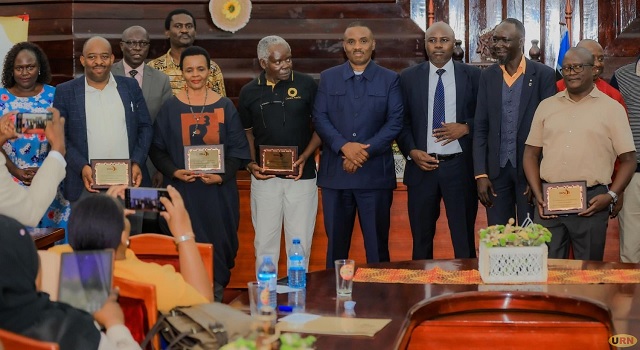
Kampala, Uganda | THE INDEPENDENT | The Cross-Cultural Foundation of Uganda (CCFU) has urged the Kampala Capital City Authority (KCCA) to expedite the “Historic Building Ordinance” to safeguard historical buildings and sites in the city.
KCCA is working on the Ordinance to protect and preserve historical buildings and sites in the city. The Ordinance will help the Authority to protect Uganda’s historical and Cultural heritage in Kampala which is at risk of mishandled in the hands of private individuals.
The Ordinance includes sections that require the government to acquire historical sites in private hands and where the property is not acquired by the government, a fund to be set up for owners as motivation and also help them maintain the sites.
Fredrick Nsibambi, the Deputy Executive Director of the Cross-Cultural Foundation of Uganda, while speaking to journalists at the 6th Heritage Awards at the mayor’s parlour in City Hall, noted that the ordinance was discussed within KCCA, but it has taken a long time to be passed, resulting in the loss of historical buildings and sites due to a lack of proper legislation.
He also said that while the country has national legislation applicable to the entire nation, its implementation and enforcement are weak.
According to Nsibambi, there needs to be a law specifically addressing Kampala city and other areas like Jinja, Entebbe, Fort Portal, and Mbarara, where historical sites and monuments have been documented.
“We are discussing with city authorities to create municipal or city ordinances to safeguard our historical sites because once we lose them, that will be the end,” Nsibambi stated.
The call comes at a time when the existence of several privately owned historical buildings and sites is threatened. Recently, Uganda’s first business Mall- Pioneer Mall was brought down as the owner sought to construct a bigger and more modern building.
Also, KCCA and conservationists are still battling with Watoto Church Limited’s management which wants to demolish the historical structure formerly known as Norman Cinema, to put up a ‘modern’ structure.
Furthermore, Nsibambi revealed that they have documented more than 25 buildings in Kampala, over 20 in Mbarara, more than 15 in Mbale, and recently over 15 buildings in Soroti that need to be preserved.
He added that those intending to demolish or destroy buildings should understand the existence and importance of these historical sites and monuments.
“We cannot stop people from demolishing because some of these properties are privately owned, but people should be aware of the value of those buildings,” Nsibambi remarked.
The Lord Mayor of Kampala, Erias Lukwago, expressed concern over differentiating modernity from the preservation of heritage.
Lukwago mentioned that several structures of historical significance have been phased out in the name of modernity, starting with the symbol of KCCA, Aldina Vislam shops the first trader in Kampala, and Bakery House, among others.
“I symbolize nothing else but confusion. The gown that I put on has an emblem with a very rich logo featuring an Impala representing Kampala, but now the logo we have is just a tower with the big word ‘KCCA.’ It is very disgusting to me,” Lukwago stated.
The mayor also expressed the need to change many of Kampala’s roads that were named after colonialists and instead name them after Ugandan individuals who have made significant contributions to the country’s development.
However, Nsibambi mentioned that colonialism is part of Uganda’s heritage in any form, which also needs to be preserved.
He mentioned that during the renovation of the Royal Mile by the Buganda Kingdom, several century-old trees of Kabaka Anjagala that were rich in history were cut and replaced with new ones.
The National Heritage Awards recognizes individuals and institutions for their outstanding contributions to preserving and promoting Uganda’s cultural heritage.
Among the recipients this year was Tooro Botanical Gardens for promoting Uganda’s indigenous trees and herbal medicine.
Tonny Owana, a veteran journalist was awarded for his role and passion in archiving and protecting Uganda’s historical materials, and Dr. Yoram Musamba from Bunyoro, among others.
*****
URN
 The Independent Uganda: You get the Truth we Pay the Price
The Independent Uganda: You get the Truth we Pay the Price





